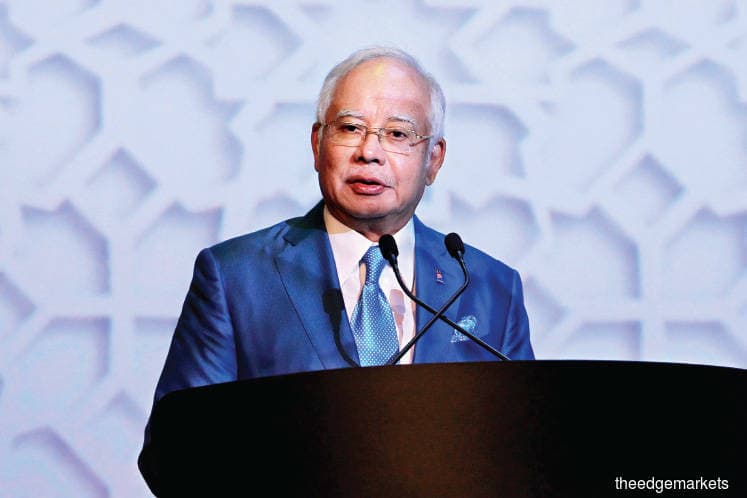
This article first appeared in The Edge Malaysia Weekly on December 25, 2017 - December 31, 2017
Prime Minister Datuk Seri Najib Razak
IN a year that had its fair share of symbolic moments, Prime Minister Datuk Seri Najib Razak took home a fistful of trophies.
One prize was his cameo meeting in September with US President Donald Trump at the White House, which counts as a juicy political point for the coming general election.
Najib brought “strong value propositions” for Trump in the form of a multi-billion dollar commitment to buy Boeing jets, an offer to push AirAsia to buy General Electric engines and a pledge to increase investments in American infrastructure.
With this gesture “to strengthen the US economy”, the premier secured numerous pay-offs, including blunting the barbs of his critics on the US Justice Department’s investigation into the troubled state investment fund 1Malaysia Development Bhd.
Though there was some collateral damage from the trip, the net gain from an electoral viewpoint would be in the PM’s favour, although Najib did remark that his comments on helping the US were misconstrued.
The tacit endorsement which Najib has earned from his meeting with the US leader would play well in rural electioneering, especially since his Washington trip was followed immediately by another photo op with British premier Theresa May.
On the home turf, Najib raised his score as the commander-in-chief of the ruling Barisan Nasional coalition through a number of moves that served to blindside the opposition parties or at least, put them on the back foot.
In early April, the government made the unprecedented move of clearing the parliamentary order paper of its business to make way for a Private Member’s Bill.
The next day, PAS president Datuk Seri Abdul Hadi Awang tabled a motion to amend the Syariah Courts (Criminal Jurisdiction) Act 1965, seeking to grant the Syariah Court powers to impose stiffer penalties on all crimes except those with the death sentence.
The enhancement of the Syariah Courts’ powers, a prize long sought by PAS but hitherto beyond its parliamentary reach, is the clearest indication to date of the coming together of the Islamist party with Umno in an electoral alliance, despite their long history of political enmity.
The shifting alignment only reflects the growing importance of religion as a cement to hold together the fractured Malay voter base.
Another aspect of this theme is the hosting of the King Salman Centre for International Peace at the Islamic Science University of Malaysia, following Saudi Arabia’s King Salman Abdulaziz Al Saud’s visit to Malaysia in March.
Not only does this move strengthen Najib’s legitimacy as a leader among Muslims, but it also burnishes his credentials as a key ally in the global fight against terrorism.
All this would go some way towards mitigating the damage that his one-time mentor turned nemesis, the tenacious former prime minister Tun Dr Mahathir Mohamad, has been inflicting on his image since the elder leader joined forces with the opposition parties.
Among the list of sins that is being laid at Najib’s feet is the view that he has sold out the country’s strategic interests to obtain a funding lifeline from China. The East Coast Rail Link, among a laundry list of infrastructure projects, has been singled out for particular criticism. The PM’s team has worked hard at fending off these claims, and Najib has retorted that he would never sell Malaysia’s sovereignty.
Helping to contain Mahathir’s virulent campaign to unseat Najib, the quick-acting Royal Commission of Inquiry into Bank Negara’s foreign exchange losses in the 1990s has shifted some attention away from his litany against the PM to the debacle that took place under Mahathir’s watch.
While the inquiry report is being challenged by Mahathir, it continues to have life enough to give Najib and his team ammunition for their battle with detractors.
Even if the electorate were unimpressed by their leaders’ quarrels over past and present scandals, they would likely be motivated by the long list of benefits that Najib announced in his budget for next year.
From a reduction in income tax rates to easier hiring of domestic help and discounts on study loan repayments, to name a few, the message that Najib has sought to convey to voters is that his government is listening to their needs.
In keeping with this softer touch, Najib paid a courtesy call on de facto Pakatan Harapan leader Datuk Seri Anwar Ibrahim when the jailed opposition leader was in hospital for an operation on his shoulder joint in November.
If nothing else, the gesture would sit well with voters who see it as a sympathetic or even magnanimous act by the nation’s leader.
That’s a good feeling to ride, going into perhaps the toughest election challenge that the BN has faced in decades.
But still, for Najib, the coast is not as clear as he would wish it to be. He has to face the increasing number of voters unhappy with the rising cost of living, the never-ending problems with FELDA and its companies (whose settlements in the Malay heartland form the core support of Umno) and the issue of 1MDB that will not easily fade from the scrutiny of international media. Also, the emergence of new politics in Sabah and Sarawak, for which the political mantra — Sabah for Sabahans and Sarawak for Sarawakians — could sway both sides of the political divide.
Save by subscribing to us for your print and/or digital copy.
P/S: The Edge is also available on Apple's AppStore and Androids' Google Play.